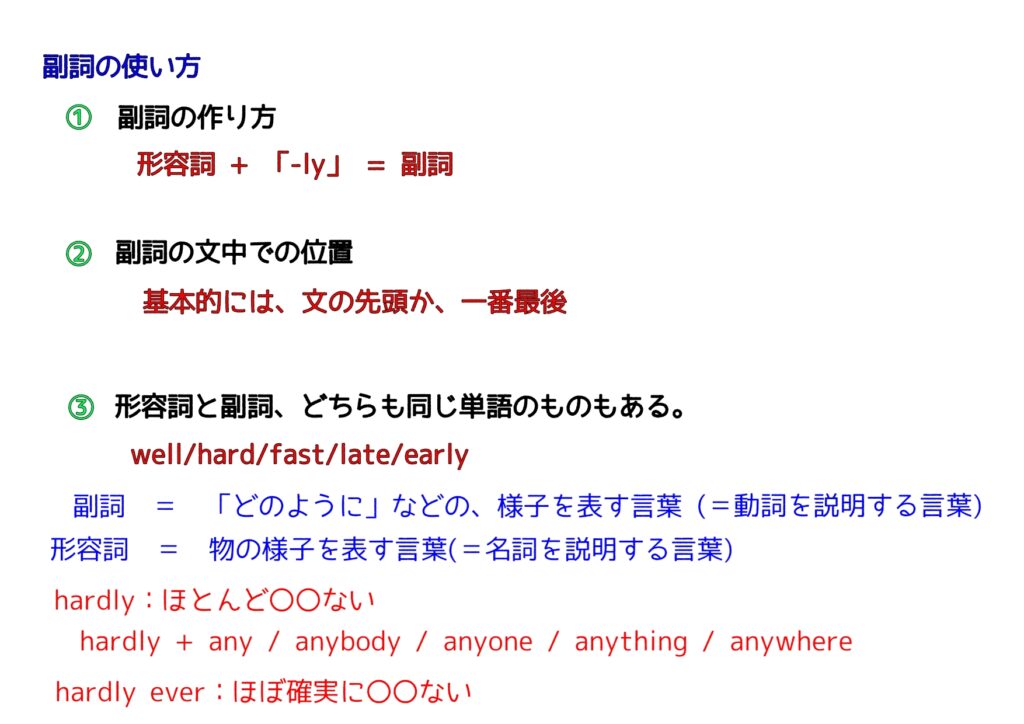第68回:形容詞を使いこなせると、英語が出来る感が出る。

形容詞一つで、会話がオシャレに思える不思議。
そんな形容詞の使い方です。
Q. この記事で、一番大事なことって何?
A. 大事なことを、1枚の画像にまとめました。

いちいちノートにまとめるのが面倒だという方、また、
ノートにまとめることが苦手だという方は、ご活用ください。

[広告]
確かな英語力は、日々の継続から。
その継続を後押しする、第二言語習得理論に基づいた
オンライン英語学習プログラムがあります。
英語を使う人のための、確実なスキルアップが望める
7日間の無料体験はこちらから!

形容詞の使い方を理解する
形容詞には、gradable(比較可能な)とnon-gradable(比較不可能な)の2つのタイプがあります。今回は、これらの形容詞の特徴や使い方について詳しく解説します。
- Gradable and Non-gradable Senses
いくつかの形容詞は、gradableとnon-gradableの意味の両方を持っています。
(i) gradableとnon-gradableでは異なる意味を持つ形容詞:
例えば、”common”はgradableの意味では「よくある、頻繁に見られる」という意味を表し、non-gradableの意味では「共通の、共有の」という意味を表します。
- Smith is a very common name.(よくある名前です。)
- We have a lot of common interests.(共通の興味がたくさんあります。)
また、”old”もgradableとnon-gradableで異なる意味を持ちます。gradableの場合は「存在が長い」という意味を表し、non-gradableの場合は「以前の、昔の」という意味を表します。
- The house is very old.(その家はとても古いです。)
- I met my old politics professor the other day.(先日、昔の政治学の教授に会いました。)
他にも、civil(公民の)、clean(きれいな)、critical(批判的な)、electric(興奮させる)、empty(空の)、false(偽の)、late(遅い)、odd(奇妙な)、original(独自の)、particular(特定の)、straight(まっすぐな)などの形容詞もgradableとnon-gradableの意味で使い分けられます。
(ii) gradableとnon-gradableで類似した意味を持つ形容詞:
いくつかの形容詞は、gradableとnon-gradableの場合で似た意味を持ちます。しかし、gradableの場合は人や物の品質について話し、修飾語として副詞を使用することができます。一方、non-gradableの場合はカテゴリーやタイプについて話します。
例えば、”foreign”はgradableの場合は「この国の出身でない」という意味を表し、non-gradableの場合は「他の国に関連する」という意味を表します。
- I don’t know where he came from, but he sounded slightly foreign.(彼がどこから来たのかわかりませんが、彼は少し外国人っぽかったです。)
- She is now advising on the government’s foreign policy.(彼女は現在、政府の外交政策について助言しています。)
他にも、academic(学問的な)、adult(大人の)、average(平均的な)、diplomatic(外交的な)、genuine(本物の)、guilty(有罪の)、human(人間の)、individual(個々の)、innocent(無実の)、mobile(動く)、private(私的な)、professional(プロの)、scientific(科学的な)、technical(技術的な)、true(真の)、wild(野生の)などの形容詞もgradableとnon-gradableの使い方で異なります。
- Emphasizing with “good and…”, “lovely and…”, “nice and…”, and Comparative Adjectives
特に話し言葉では、”good and…”、”lovely and…”、”nice and…”の形で、2つ目のgradable形容詞を使用して強調することがあります。
例えば、”good and relaxed”(とてもリラックスした)や”lovely and warm”(とても暖かい)などです。ただし、”good and beautiful/rich/tall”などの組み合わせは通常使用されません。
また、比較級の形容詞を”and”で繋げることで、形容詞が表す品質の増加を話すことができます。”more and more + 形容詞”という形で使用します。
例えば、”As she got more and more excited, her voice got higher and higher and louder and louder.”(彼女がますます興奮するにつれて、彼女の声はますます高く、ますます大きくなりました。)
このように、gradable形容詞とnon-gradable形容詞の違いや、強調表現について理解することで、より正確な表現やニュアンスを表現することができます。
具体例
- Some adjectives have both gradable and non-gradable senses.
(i) Gradable and non-gradable senses with different meanings:
- The situation is getting critical. (reaching a dangerous point; gradable)
- The patient’s condition is critical. (severe and life-threatening; non-gradable)
(ii) Gradable and non-gradable senses with similar meanings:
- She is an average student. (moderate in performance; gradable)
- She studies at an average school. (typical or ordinary; non-gradable)
- Emphasizing gradable adjectives with “good and…,” “lovely and…,” and “nice and…”:
- He was good and ready for the challenge.
- The cake was lovely and moist.
- The room is nice and bright.
Linking comparative adjectives with “and” to express increasing degrees:
- The river flowed deeper and deeper.
- The music became louder and louder.
- The colors grew brighter and brighter.
[広告]
TOEICのスコアを上げたいけれど、
まとまった勉強時間が取れなくて困っている…
なら、細かいスキマの時間を使いながら、
少しずつスキルを積み重ねてみてはどうでしょう。
スマホ1つでスコアアップが出来る、
オンライン講座のリンクはこちらから。

Q. この文法はどうやって使うのでしょうか?
A. 今回の文法を活用した会話文を見てみましょう。

How was the party last night?
(昨夜のパーティーはどうだった?)

It was good and fun! The music was loud, and everyone was dancing. We had a lovely and relaxed time.
(とても楽しくて良かったよ!音楽は大きかったし、みんな踊ってたし。素敵でリラックスした時間を過ごしたよ。)

That sounds nice. I wish I could have been there.
(それはいいね。私も行ければ良かったな。)

Yeah, it was nice and lively. And the decorations were nice and colorful too.
(そうだよ、賑やかで楽しい雰囲気だったよ。それにデコレーションも素敵でカラフルだったよ。)

I heard the food was good and delicious.
(食べ物は美味しかったって聞いたよ。)

Absolutely! The catering did a fantastic job. The dishes were nice and flavorful.
(本当に!ケータリングの人たちが素晴らしい仕事をしてくれたんだ。料理は美味しくて風味豊かだったよ。)

I’m glad to hear that. I’ll make sure to join the next party.
(良いパーティーで良かったね。次のパーティーには必ず参加するよ。)

You should! They always know how to throw a good and memorable event.
(ぜひ来て!彼らはいつも素晴らしい思い出になるような楽しいイベントを開催しているんだ。)
[広告]
ロゼッタストーン・ラーニングセンターで、最先端の教育制度を活用して英語を学びませんか?私たちは個々の学習ペースに合わせてeラーニングと対面教育を組み合わせ、柔軟な学習環境を提供しています。自宅でのeラーニングと対面教育のメリットを最大限に活かし、あなたの英語学習をサポートします。最新のテクノロジーと個別の指導が組み合わさった当センターで、自由な学習スタイルを体験してみませんか?英語学習を楽しく効果的に進めるための環境がここにあります。新たな一歩を踏み出して、新しい英語学習の旅に参加しましょう!

Q. この記事の要点は?
A. 形容詞を会話等で使うときの方法を確認しました。
- Some adjectives have different senses when they are gradable and non-gradable.
- Gradable: Referring to the degree or quality someone or something has.
- Non-gradable: Referring to the category or type someone or something belongs to.
- Some adjectives have similar meanings when gradable and non-gradable, but they serve different purposes.
- Gradable: Qualitative adjectives describing the quality of a person or thing.
- Non-gradable: Classifying adjectives indicating the category or type.
- In spoken English, phrases like “good and…,” “lovely and…,” and “nice and…” can be used to emphasize the second gradable adjective.
- Patterns: good and ready, lovely and dry/soft/sunny/warm, nice and bright/clean/cold/comfortable/early/fresh/quiet/simple/soft/tidy/warm.
- Comparative adjectives can also be linked with “and” to indicate an increasing degree of the described quality.
- Pattern: more and more + adjective.
Note: Some adjectives have specific limitations regarding their usage with certain gradable or non-gradable senses.
英会話を始めてみたいけれど、どのサービスが良いか分からない…
そんな方は、まず、この記事で3つのサービスを比べてみてはいかがでしょうか?
英語力を効率良く伸ばすことができるサービス3選です。

次回の文法解説は?
形容詞のいろんな種類
この記事を作る際に参考にした文法の解説書になります。
すべて英語で書かれていますが、練習問題が付いてます。
イギリス英語なので、スペル等の表記が異なる部分もありますが、
「使い方を練習したい」「繰り返し問題を解きたい」
という方は、使ってみても良いかもしれません。

関連記事一覧
[広告]
日本人の講師と学んで、英語を使う不安を減らし、
ネイティブの講師とのレッスンで、学んだことを活用する
そんな、体系的な英会話のレッスンを提供している、
オンライン英会話スクールのリンクはこちら。

他の文法解説記事を検索できます。



-320x180.jpg)
-320x180.jpg)



-320x180.jpg)





コメント